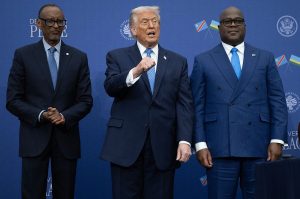El Salvador’s young and telegenic president, Nayib Bukele, has rewritten the rules. Term limits? Scrapped. Presidential terms? Extended. Runoff elections? Abolished. If all goes according to the script – penned and passed by his party in the legislature – Bukele will remain in power well into the 2030s, if not beyond.
A decade ago, such a move might have sparked bipartisan alarm in Washington. Today, reactions are mixed – with many in the growing MAGA wing cheering El Salvador’s constitutional shake-up as a win of their own.
This shift is a window into a deeper realignment in conservative foreign policy: one that moves closer to the unapologetic defense of national interest and drifts further from the spread-democracy-everywhere consensus.
What makes this case especially eye-catching is that Bukele is, of course, no ordinary leader. He rose to power on a promise to end the gang violence that long made El Salvador one of the most dangerous countries on Earth. And by most measures, he’s delivered. Homicides have plummeted. Extortion rackets have collapsed. Salvadorans can now walk the streets at night and let their kids play outside. He may have packed the prisons – and skipped a few due-process steps along the way – but the impact is undeniable.
With MAGA, impact sells. “The people of El Salvador have found a transformational leader,” declared former Congressman Matt Gaetz on X. “They deserve to keep President Bukele as long as they want him.”
It’s not just lawmakers. Bukele has become a superstar among the American right’s activist and pundit class, with fans including Elon Musk. The leader is a symbol of tough-on-crime leadership with digital-age flair – governing like a startup CEO, tweeting like a memelord and dubbing himself a “philosopher king.”
While his popularity may be understandable, that doesn’t settle whether his actions are justified – or in America’s long-term national interest. Beyond the spectacle of friend-versus-foe politics, there are harder policy questions worth confronting.
Joshua Treviño, Senior Fellow at the America First Policy Institute’s Western Hemisphere Initiative, told me that “the whole reason term limits became a feature in El Salvador to begin with is the incredibly rich history of caudillismo in Latin America.” Caudillismo refers to a political system characterized by the dominance of a military-backed, charismatic strongman. Treviño cautions against viewing the situation through a simplistic lens: “We’ve seen caudillismo work around limits before,” he noted, pointing to both Mexican and Salvadoran history. “I’d encourage those fixating on El Salvador to think beyond the case study of Hugo Chávez.”
Treviño adds that a hierarchy of needs must be considered. “America’s interest is to have [an El Salvador] that is safe, that cooperates on immigration, that provides for flourishing,” he said. “None of this means we abdicate our criticism, but this one thing doesn’t strike me as the straw that breaks the camel’s back.”
He has a point. History may rhyme – but we shouldn’t mistake the verse. And Bukele has indeed gone further than any of his peers in cooperating with Trump’s deportation agenda. In today’s foreign-policy calculus, that counts for something.
Daniel Di Martino, a fellow at the Manhattan Institute, emphasized caution in his remarks to The Spectator. “Bukele did make El Salvador a safer country,” he concedes. “But he hasn’t done anything meaningful to make it a richer country. Salvadorans still emigrate; they still depend on remittances.” His concern? That Bukele’s “lack of commitment to the rule of law will only deepen economic isolation and underdevelopment.”
For Di Martino, the issue isn’t a dramatic collapse – but long-term stagnation, something like what’s occurred under Rwandan President Paul Kagame, a technocrat who won the war on violence but lost the prosperity in peacetime.
This tension – between short-term success and long-term order – is causing friction among the American right. On one side, there’s the realpolitik crowd, eager to see results and happy to have a regional partner who plays ball. On the other, there’s the group flinching at the idea of celebrating power-consolidation, no matter how well-dressed.
I’ve noticed something fascinating among the folks who focus on this region, some of whom are quoted above and some of whom fear to comment on such a beloved figure: they all agree on the immediate benefits of Bukele’s reign. But they don’t agree on the risks.
Heberto Limas-Villers, a Latin America specialist, shared with me excitement for the short-term successes, but worried that “in the long term, such actions can be harmful to the country, especially as Bukele ages and needs to find a worthy successor.” Similarly, Joseph Addington, who writes a Latin America column for The American Conservative, cautioned me about two potential risks: Bukele could go the way of former Peruvian President Alberto Fujimori and “squander his law-and-order popularity on corruption and favoritism”; or he could remain effective but leave with a succession crisis.
One thing is clear: Bukele is still riding high, both in El Salvador and in Washington. He’s turned a nation of fear into a showroom for tough-on-crime governance. When he tweets his defense – in English – accusing critics of attacking “a poor country [that] dares to act like a sovereign one,” it reaches an audience almost as big as the population of his entire country.


























Leave a Reply